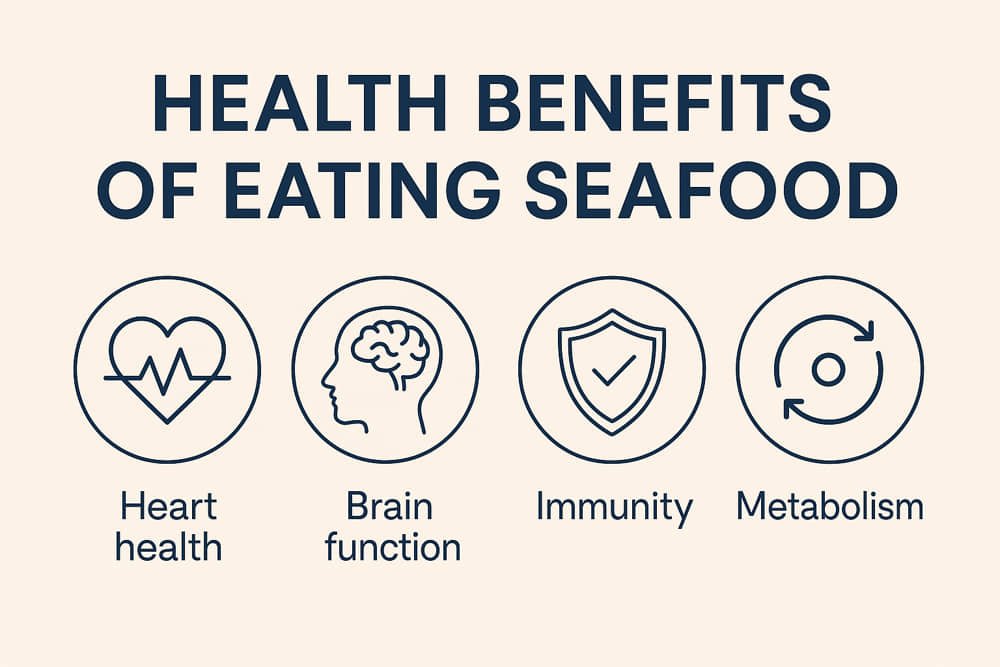Seafood stands as one of the most nutritionally valuable food groups worldwide. With its rich profile of essential nutrients including high-quality proteins, heart-healthy omega-3 fatty acids, and vital vitamins and minerals, seafood contributes significantly to overall health and well-being. Populations with high seafood consumption, such as those following the Mediterranean or Japanese diets, consistently exhibit lower rates of chronic diseases and longer life expectancy.
Understanding the health benefits of seafood through a scientific lens helps individuals make informed dietary choices. This article explores the proven advantages of incorporating seafood into a balanced diet, covering its role in cardiovascular health, brain function, metabolism, and beyond.
Contents
- 1 What Makes Seafood a Nutritional Powerhouse?
- 2 How Does Eating Seafood Improve Heart Health?
- 3 Can Seafood Consumption Boost Brain Function and Mental Health?
- 4 How Does Seafood Support Weight Management and Metabolism?
- 5 Does Seafood Strengthen Bones and Prevent Osteoporosis?
- 6 What Are the Immune-Boosting Properties of Seafood?
- 7 Is Seafood Beneficial for Eye Health?
- 8 How Does Eating Seafood Promote Healthy Skin and Hair?
- 9 Are There Anti-Cancer Properties Associated with Seafood?
- 10 Who Should Eat More Seafood? Special Considerations
- 11 Are There Any Risks Associated with Eating Seafood?
What Makes Seafood a Nutritional Powerhouse?
Seafood is uniquely rich in several essential nutrients that play critical roles in maintaining human health:
- Omega-3 Fatty Acids (EPA and DHA):
These long-chain fatty acids are not produced efficiently by the human body and must be obtained through diet. EPA and DHA, found primarily in fatty fish like salmon, mackerel, sardines, and herring, support heart health, reduce inflammation, and are vital for brain development and function. - High-Quality Protein:
Seafood provides complete proteins containing all nine essential amino acids necessary for muscle maintenance, repair, and overall body function. Unlike red meat, seafood proteins are low in saturated fats, making them a healthier alternative for cardiovascular health. - Vitamins and Minerals:
- Vitamin D: Found abundantly in salmon, sardines, and tuna, essential for calcium absorption and bone health.
- Vitamin B12: Crucial for red blood cell production and neurological function, widely present in clams and oysters.
- Iodine: Important for thyroid health and metabolic regulation, concentrated in seaweed and saltwater fish.
- Selenium and Zinc: Powerful antioxidants that boost immune function and protect against oxidative stress.
Compared to other protein sources, seafood offers a superior combination of nutrients with fewer calories and unhealthy fats, making it a cornerstone of health-optimized diets.
How Does Eating Seafood Improve Heart Health?
Scientific research consistently shows that regular seafood consumption significantly lowers the risk of heart disease. According to the American Heart Association, eating at least two servings of fish per week can reduce the risk of fatal heart attacks by up to 30%.
The primary reason for this cardiovascular benefit lies in the high concentration of EPA and DHA omega-3 fatty acids found in fatty fish. These compounds provide multiple heart-protective effects:
- Lowering Triglyceride Levels:
Consuming 1 to 4 grams of EPA and DHA daily can reduce triglyceride levels by 20% to 50%. - Reducing Blood Pressure:
Omega-3 fatty acids improve arterial function, lowering systolic and diastolic blood pressure. - Preventing Blood Clots:
EPA and DHA reduce blood platelet aggregation, decreasing the risk of clot formation. - Stabilizing Heart Rhythms:
Omega-3s help stabilize electrical activity in the heart, reducing the risk of arrhythmias.
Regular inclusion of fatty fish such as salmon, sardines, and mackerel provides optimal intake of these critical nutrients, supporting heart health and reducing the likelihood of cardiovascular events.
Can Seafood Consumption Boost Brain Function and Mental Health?
Seafood, particularly oily fish, plays a critical role in supporting brain health and improving mental well-being thanks to its high levels of docosahexaenoic acid (DHA).
- Enhancing Cognitive Performance:
Older adults who consume fish at least once per week have significantly lower rates of cognitive decline, as shown in a 2016 study published in JAMA. - Reducing Depression and Anxiety:
Clinical trials show that individuals supplementing with 1,000 mg of EPA daily experience a 20% reduction in depressive symptoms. - Preventing Neurodegenerative Diseases:
Regular consumption of fatty fish can reduce the risk of dementia by up to 36%, according to a meta-analysis in the American Journal of Clinical Nutrition. - Essential During Pregnancy:
Pregnant women consuming at least 300 mg of DHA daily support better cognitive outcomes in their children.
Including seafood like salmon, sardines, and mackerel ensures optimal DHA and EPA intake, directly supporting mental clarity and long-term brain health.
How Does Seafood Support Weight Management and Metabolism?
Seafood is an effective protein source for managing weight and enhancing metabolism.
- High Satiety Effect:
Protein-rich meals including fish can reduce calorie intake by up to 12% compared to carb-heavy meals. - Thermogenic Effect of Protein:
Protein digestion increases calorie burn by 20% to 30%, compared to just 5% to 10% for carbohydrates. - Boosting Metabolism with Omega-3s:
Consuming 3 grams of omega-3s daily significantly increases fat burning and resting metabolic rate. - Low-Calorie, Nutrient-Dense Options:
Lean seafood like cod, haddock, and shrimp contain fewer than 100 calories per 100 grams, making them ideal for calorie-controlled diets.
Eating seafood at least three times per week helps regulate appetite, increase fat metabolism, and support sustainable weight management.
Does Seafood Strengthen Bones and Prevent Osteoporosis?
Seafood provides nutrients critical for bone health, helping prevent osteoporosis:
- Vitamin D for Calcium Absorption:
Fatty fish like salmon and sardines deliver up to 600–1,000 IU of vitamin D per 100 grams. - Rich Source of Calcium:
A 100-gram serving of canned sardines offers 382 mg of calcium, meeting nearly 38% of daily needs. - Role of Omega-3s in Bone Preservation:
Postmenopausal women supplementing with omega-3s for six months experienced significant improvements in bone mineral density.
Regular seafood consumption ensures adequate vitamin D, calcium, and omega-3s, supporting bone strength and reducing the risk of osteoporosis.
What Are the Immune-Boosting Properties of Seafood?
Seafood strengthens the immune system through critical micronutrients and anti-inflammatory compounds.
- Zinc and Selenium for Immune Defense:
Oysters provide over 600% of daily zinc needs per 100 grams, while tuna and sardines are rich in selenium. - Omega-3s Reduce Inflammation:
EPA and DHA help lower pro-inflammatory cytokine production, strengthening the body’s defense against infections. - Support for Respiratory and Gut Immunity:
Omega-3s improve lung health and contribute to a balanced gut microbiome, where 70% of immune cells reside.
Consuming seafood regularly fortifies the immune system naturally, reducing illness frequency and speeding recovery.
Is Seafood Beneficial for Eye Health?
Seafood supports eye health and helps prevent vision loss, especially with age.
- DHA and Retinal Health:
DHA accounts for up to 60% of the polyunsaturated fatty acids in the retina, preserving visual function. - Prevention of Age-Related Macular Degeneration (AMD):
High omega-3 intake is associated with a 30% lower risk of AMD development. - Protection Against Dry Eye Syndrome:
Consuming 1,000 mg of omega-3s daily significantly improves tear production and reduces dry eye symptoms.
Including fatty fish like salmon and mackerel helps maintain sharp vision and prevents age-related eye disorders.
How Does Eating Seafood Promote Healthy Skin and Hair?
Seafood improves skin health and strengthens hair due to its rich nutrient profile.
- Omega-3s Improve Skin Hydration and Elasticity:
Six weeks of omega-3 supplementation has been shown to improve skin moisture retention and elasticity. - Zinc and Protein for Hair Growth:
Tuna provides over 25 grams of protein per 100 grams, essential for keratin production, while oysters offer high levels of zinc to prevent hair thinning. - Vitamin E and Selenium for Skin Protection:
Antioxidants found in seafood reduce oxidative stress, slowing the skin aging process and protecting against UV damage.
Including seafood regularly in the diet promotes vibrant skin and stronger, healthier hair.
Are There Anti-Cancer Properties Associated with Seafood?
Seafood offers protective effects against several types of cancer:
- Omega-3s Combat Chronic Inflammation:
Individuals consuming higher omega-3 levels have a 23% lower risk of breast cancer. - Selenium as an Antioxidant:
Adequate selenium intake reduces prostate cancer risk by 31%. - Lower Risk of Colorectal and Prostate Cancer:
Consuming fatty fish regularly reduces colorectal cancer risk by up to 20%.
Through its anti-inflammatory and antioxidant properties, seafood helps reduce the risk of cancer when included as part of a balanced diet.
Who Should Eat More Seafood? Special Considerations
Certain groups particularly benefit from increased seafood intake:
- Pregnant and Breastfeeding Women:
Consuming at least 300 mg of DHA per day supports fetal brain development and cognitive health in children. - Elderly Individuals:
Omega-3s and vitamin D support cardiovascular, bone, and cognitive health in older adults. - Athletes and Physically Active People:
High-quality protein and omega-3s support muscle recovery and reduce joint inflammation. - Individuals with Chronic Inflammation:
Those with autoimmune diseases benefit from the anti-inflammatory properties of omega-3 fatty acids.
Are There Any Risks Associated with Eating Seafood?
While seafood offers exceptional health benefits, it is essential to manage certain risks:
- Mercury and Heavy Metal Contamination:
Large predatory fish such as shark and king mackerel should be limited. Opt for low-mercury choices like salmon, sardines, and shrimp. Learn more about this in What Are the Risks of Mercury in Seafood?. - Allergic Reactions:
Shellfish allergies are common and can cause severe reactions. Those with known allergies should avoid shellfish entirely. - Microplastic and Pollutant Exposure:
Choose sustainably sourced, wild-caught seafood to minimize contaminant risks.
Following the FDA and EPA’s “Best Choices” list ensures safe consumption while maximizing nutritional benefits.
When consumed responsibly, seafood remains one of the most effective natural sources for improving overall health. Its rich profile of essential nutrients, including high-quality proteins, omega-3 fatty acids, and vital minerals, supports heart health, enhances brain function, strengthens bones, and boosts the immune system. By incorporating a variety of safe, sustainably sourced seafood options into regular meals, individuals can achieve long-term health benefits without compromising safety.



